2022 Kia EV6 GT Line review: Charges faster than a Porsche, priced like a Tesla


Kia's long-awaited, high-tech electric vehicle, the EV6, is finally in Singapore, and it's a properly exciting EV, since it brings something new to the market.
Hyundai's leap-frogged the competition when it comes to EV tech – its E-GMP platform that underpins both the Hyundai Ioniq 5 and Kia EV6 (and its future EV offerings) offers class-leading EV drive tech and the fastest charging on the market – faster even than the previous record holder for Singapore, the Porsche Taycan.
The Standard (Single Motor, Standard Range, 170hp) and the GT Line (Long Range, Dual Motor, 325hp). The intermediate models – Standard Range Dual Motor (232hp), a Long Range Single Motor (225hp) – are not confirmed, but Kia Singapore has plans to bring in the range-topping near-600hp high-performance EV6 GT model in the future.
The thing is, a year ago, the Kia EV6 would've been a surefire best-seller with what it has to offer. But now Tesla's taking scalps in the EV passenger market, and there are mega COE prices to contend with.
Is the EV6 still capable of delivering the knockout factor to make you open your wallet wider? And if you can't, what then? We've got the answers.
The car's footprint is quite unique – it's a midsize car, bordering on large, of a similar footprint to the Tesla Model 3 / Model Y, but splitting the two in terms of height.
Comparing it to a "normal" car, the BMW 3 Series, it's not as long, but quite a bit wider at 1,890mm, and nearly 10cm taller, a 1,550mm.

The EV6, as the de facto flagship for Kia's electric era, certainly is. Like other EVs, its form is dictated by aerodynamics – the low nose and the ducktail are dead giveaways – but we're very glad Kia took some design risks here.

This includes the wide, one-piece contoured bonnet, and the gently curved rear light bar, not to mention the very aggressive rake of the A-pillars. It's certainly less friendly-looking than the Ioniq 5 – and it doesn't look like its brother at all.
There are some visual differences between the Standard car and the GT Line: The Standard has a more benign front end design, note the darkened lower section, which contrasts to the GT Line's more contoured "jaw". The GT Line's lights are also thinner, active matrix LED headlamps, while the Standard car's is a simpler LED mainbeam.

Kia has come a very long way from its first issue, which could be described as "generic appliance cars". As we've seen in almost every Kia release of the near past – including the Stinger, Sorento, and Niro – the brand now makes cars that are genuinely exciting to look at.

The GT Line also body-coloured fenders (dark on the Standard), an aero rear section with a unique reverse light design.

Both have the same 19-inch wheel design, although the GT Line's are finished with black spokes instead of grey ones, and both have the trick pop-out handles that deploy when you approach, or unlock the car.

We've seen quite a few EVs now. Many are the same as their ICE brothers, but the EV6 is a "full-on" EV like the Tesla Model 3 and Polestar 2 and once you step inside there's no doubt you're driving something of the future.

The dual 12.3-inch screens are decent, though they certainly won't win the Screen Size Wars (not with behemoths like this, or this) and have a slight lag, at least they're sharp and easy to read.
You need a bit of forward lean to engage the infotainment touchscreen, but it's simple to navigate and does a good job of explaining almost every feature to you via text.

The shifter section sees Kia's rotary gear selector and the morphing infotainment/AC control bar – both as seen on the new Niro – but it's the wide storage space below that clue you into the fact that you're in an EV.

But the EV6 really scores points in two places: Firstly, it's very well-appointed. All the must-haves and the nice-to-haves are included, and what shores up Kia's mainstream appeal is that the Standard model has almost everything the GT Line does – except for GT Line suede trim/seats, and alu pedals.

This encompasses keyless go, heated/cooled seats, sunroof (fully electric),TPMS, auto tailgate, auto everything (mirrors, mirror dimming, wipers, lights), a wireless charger and more. There's even a fancy 3D, 360 degree surround view camera that's the same as what the German luxury cars have.

It also includes a very full suite of advanced driving assistance systems (ADAS) – more on that in the driving section. A good, healthy list, but so far, so Kia.

But secondly, Kia also has taken pains to improve the presentation of everything – vividly patterned textile on the armrest and dashboard, a whole lot of ambient lighting zones, premium feeling materials at key touchpoints.

Now 1 and 2 combined do not a luxury car make, but the Kia has pretty much everything you could expect from a well-specced luxury car that costs even more than the Kia's $280,000+.
Does that sound familiar? Key competitors Tesla and Polestar also occupy the premium, semi-demi-luxury space.

There are niggles, though: The Android Auto/Apple CarPlay is wired-only, a disappointment in an otherwise very high tech car.
And for the first time we see Kia sacrifice usability for presentation: The row of touch buttons that control the seat/wheel heating are also a perfect resting point when your fingers engage the morphing infotainment/ac control bar, which is why I roasted my passengers' behinds – and my hands – on multiple occasions.
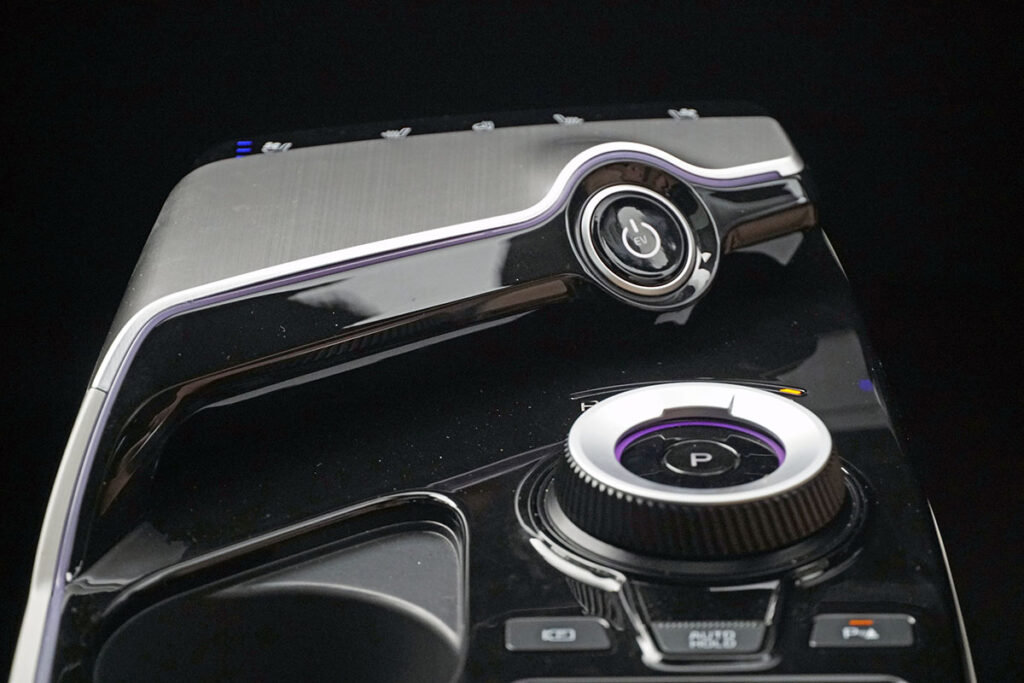
Like the Ioniq 5, the EV6 has plenty of interior room, although the Hyundai at 1,605mm is a considerably 55mm taller – so tall families take note.

The front sees plenty of useful stowage space thanks to the EV traits of lacking a transmission/drive tunnel, and a flat floor all around. There's a large cargo area under the gearshifter, the armrest has more space.

Toward the rear, the Kia's aggro roofline eats into headroom, but only if you really lean back. Cleverly, Kia's rear seats can recline rearward for more "virtual" headroom, although disappointingly they do not move fore or aft to give more flexibility for passengers/cargo.

And speaking of seats, the car's Comfort Relaxion seats are worth a mention, being one of the best we've tested with our seasoned, leathery, veteran posteriors.
They've been designed to evenly distribute your body weight, and they are – front and back – immediately, very comfortable with a lack of pressure points or awkwardness. The heating/cooling (standard) just adds to the plushness.

The EV6 also has the rare (to-date) V2L (vehicle to load) capability, meaning it can use its battery pack to power external appliances. There's also an option for internal V2L (in-cabin), though that option is not yet available for Singapore.
The boot stows 520-litres, which is not superb considering the size of the car. It's a high, flat boot, but there's a variable height floor, and some space underneath it where you can stow the tonneau cover, and a tyre repair kit below. There's a frunk of just 20-litres – you can fit maybe a ring folder or some VCDs – with the single motor model packing 50-litres.
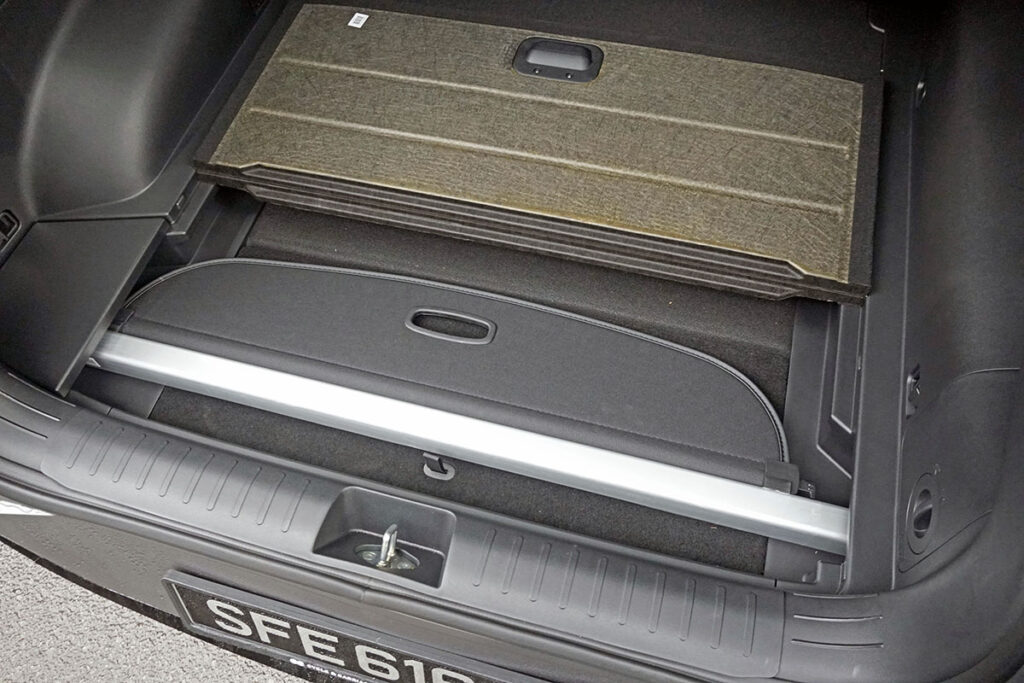
The EV6 is quiet, torquey, and easy to drive, with slightly stiff suspension that can get quite jiggly. Yes, it's just like the Polestar 2 and Tesla Model 3 – because to a much larger extent than ICE cars, EVs drive very similarly.
This is not a bad thing, since it translates into tranquil urban commuting. Like its rivals, the noises that disrupt the peace all come from external sources, the roar of a diesel HGV, even the tyre hiss of a van or sports car.
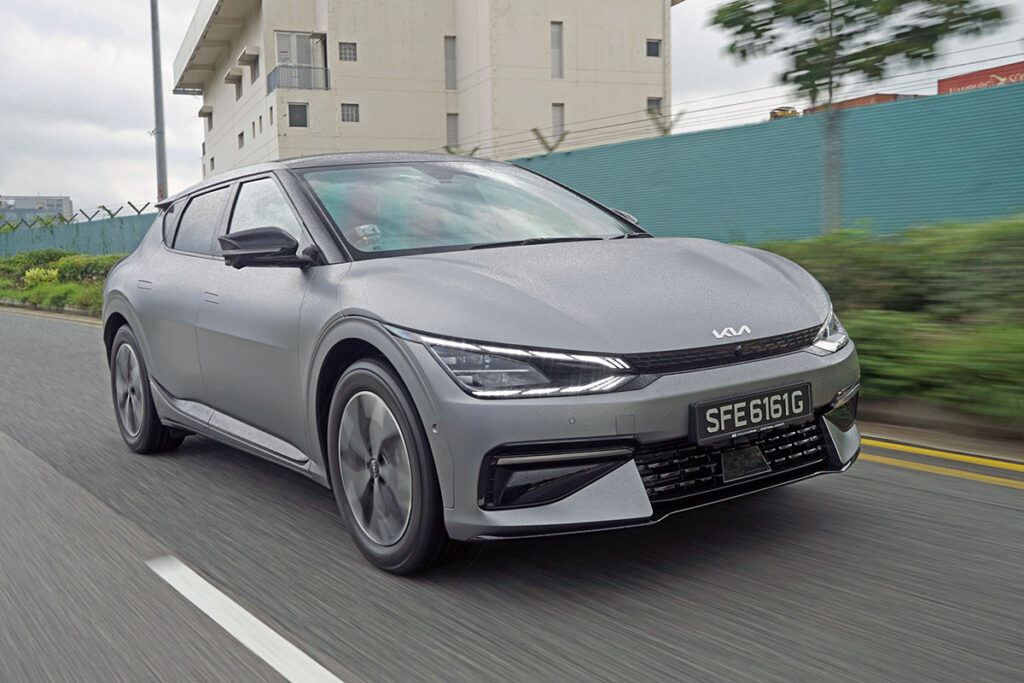
With the ease of urban driving and the very comfy seats, plus all the nice amenities, the EV6 makes the urban grind quite tolerable, even enjoyable.
It also has clever driver support systems – the automatic regenerative braking adjusts the "engine" braking cleverly, without sudden jerks, and the adaptive cruise control and lane keeping/steering assist all do the job well in traffic.
Another useful feature is the lane monitor camera system first seen on the Kia Sorento.

There are no special chassis differences between the GT Line and Standard cars, and both run on similar 19-inch wheels.
The car's EV-specific platform – E-GMP – shows its not just technology bluster. It weighs just over two-tonnes, which is actually rather svelte as this class of EVs go. And it's relatively nimble and weatherly, with little of the slop and wallow that heavier EVs show.
It isn't super-torquey quick, but it is more than fast enough for most people. In sport mode it makes a little more electronically-generated noise, but make no mistake, this charges faster than a Taycan, but isn't near it in dynamic terms.

Our complaints? The steeply-raked A-pillars do make for tricky sight-lines, and there's noticeable tyre noise above 75km/h.
We also suspect the single motor Standard model will be more enjoyable to drive, since it's lighter and rear-wheel drive in the bargain, since this often is true for petrol-powered cars too.
Kia's Niro EV was one of the longest-ranging EVs we drove, even in 2021, and the Kia EV6 is even more adept at going the distance.
Officially, the car does 17.2kWh/100km, and our ham-footed test drive over 150km clocked in 17.3kWh/100km. If you stick further away from triple digits, especially on the highway, you can bring that down to 16-ish kWh/100km, and around 450-plus km per full charge.
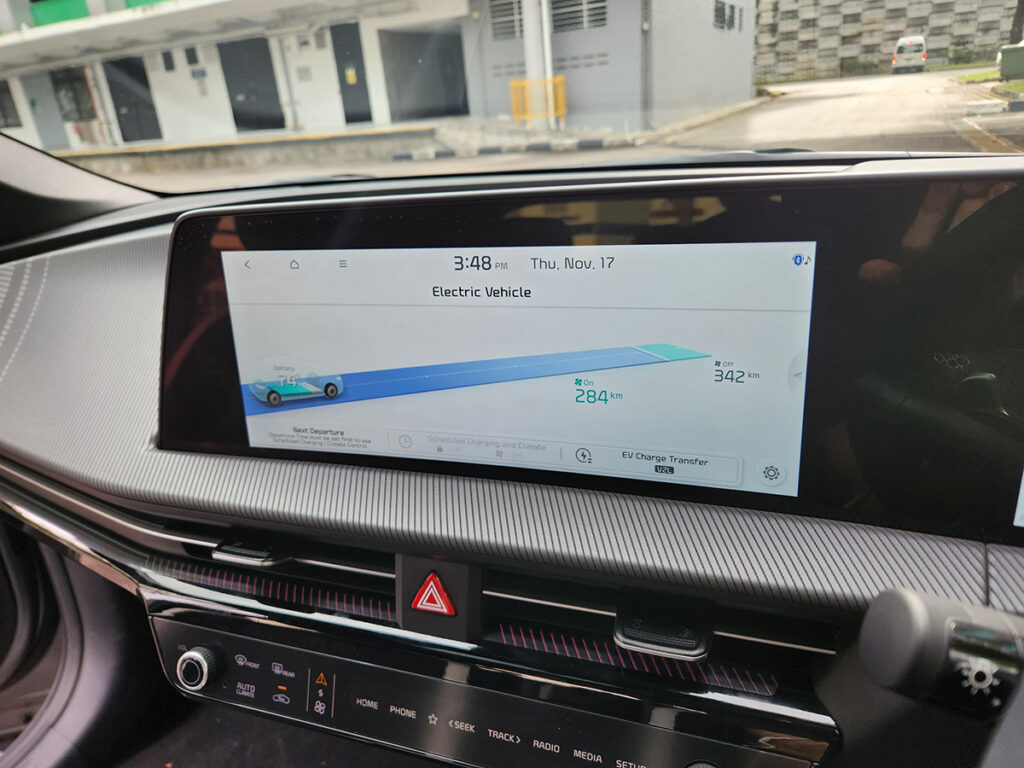
As for charging, the car takes around eight hours at the standard 11kW wallbox rate. Which brings us to the Intercontinental Heavyweight Champion of the World question: Does the super fast charging matter?
Yes and no. Yes because even the Porsche Taycan takes 22.5 minutes to go from 10 to 80 per cent, compared to 18 minutes for the EV6. Tesla's Model Y takes "around 20 minutes".
No, because Singapore's fastest DC chargers currently top out at 150kW. 350kW chargers are still a few years out, and the only 350kW fast charger we've seen in person is Hyundai's concept E-Pit, and super-fast chargers are also super-expensive.
Kia doesn't provide an official figure for that speed of DC charging, but our estimate would be around half an hour. So while it can't quite go at its maximum charge rate just yet, prospective owners might be glad to know it's very future proof and leading the EV charging tech race for now.

From what you've read, you can gather that the EV6 is an extremely capable car – one that you could rightly consider to be one of the most technologically-capable EVs on the market now.
Its killer feature is – through no fault of its own – not applicable just yet, but it'll still be a point of pride if you're the sort to get all amped up by future proofing.
The real problem for now, is that nobody has been able to reach Tesla's performance at the same price.
ALSO READ: 2022 Kia Niro Hybrid review: Practical, stylish, and surprisingly quite posh
The EV6 GT Line splits the Model Y RWD and Model Y Performance in both price and performance terms, with the former offering excellent dollar value. And if you look to the Continent, the Polestar 2's pricing is almost the same as the Kia's across the two variants.
In other words, even in an EV world, the Kia ain't cheap. It is, in fact, Kia's most expensive car to date.
Scary fact spat out, COE prices are a big part of that – the EV6 would be much more palatable at a $220,000 price point, though its rivals would still be in lock-step with it. In that sense, it needs an owner who's not afraid to rumble on the streets without falling back on a badge.
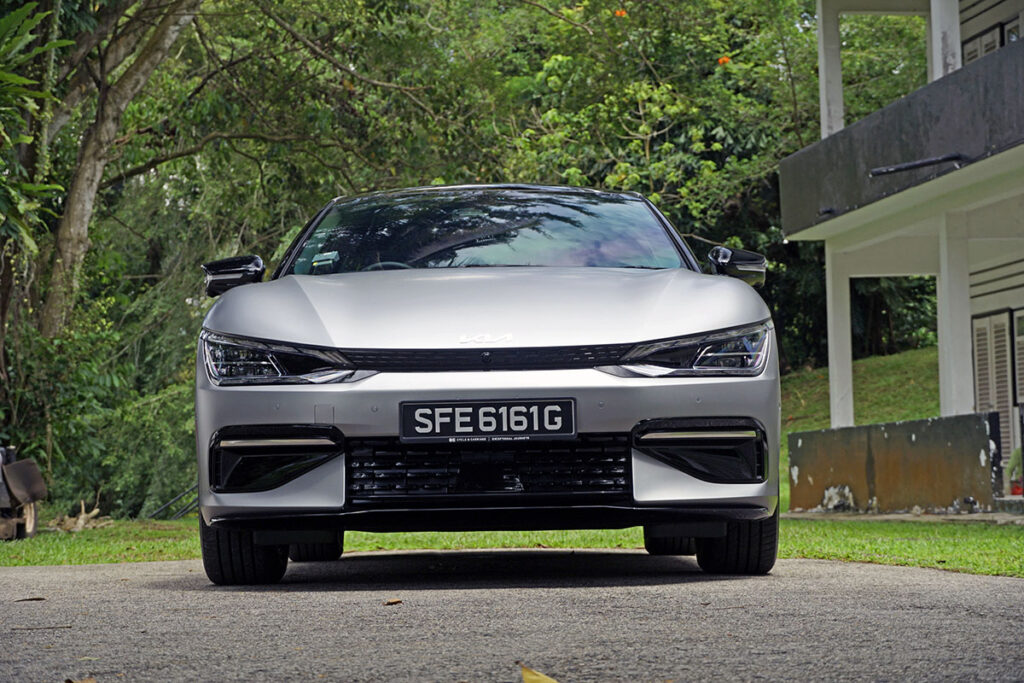
The Kia EV6 is the Korean company's most impressive car to date, in sheer technology terms: It looks very cool, it drives well, is long-ranging, and has a blend of tech and qualities that make a driver's life easier, and more comfortable.
The verdict is this: There's enough pros and cons, branding aside, that an EV buyer would be remiss not to consider the EV6 here, even against Polestar and Tesla.
If these EVs were wrestlers and we threw them all in the ring, the EV6 could easily come out on tops, they're that competitive. In other words, choosing a full-on, tech-heavy EV just got a lot harder, thanks to Kia.
| Drivetrain type | Full electric |
| Electric motor / layout | Dual / front – rear |
| Motor power / torque | 325hp / 605Nm |
| Battery type / net capacity | Lithium ion, 77.4kWh |
| Normal charge type / time | 10.9kW AC / 8 hours |
| Max fast charge type / time | 350kW DC / 18 minutes 10 to 80 per cent |
| Electric range* | 450km |
| 0-100km/h | 5.2 seconds |
| Top speed | 188km/h |
| Efficiency* | 17.2kWh/100km |
| VES band | A1 / –$25,000 |
| Agent | Kia Singapore |
| Price | $285,000 with COE and VES |
| Availability | Now |
| Verdict | Kia's most expensive car to date is also its most technologically impressive – don't consider a bleeding-edge EV without looking at the EV6. |